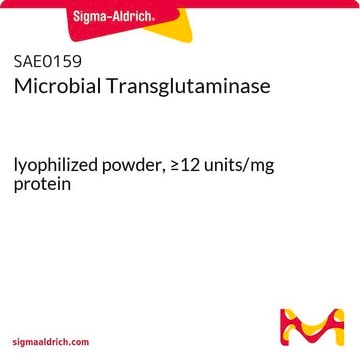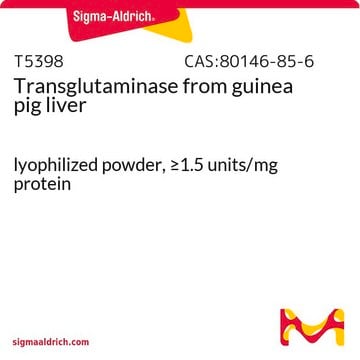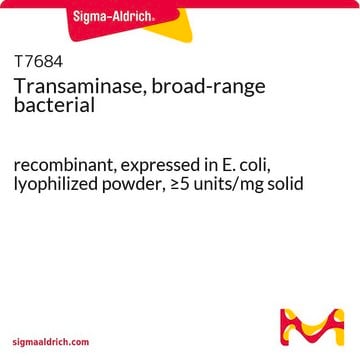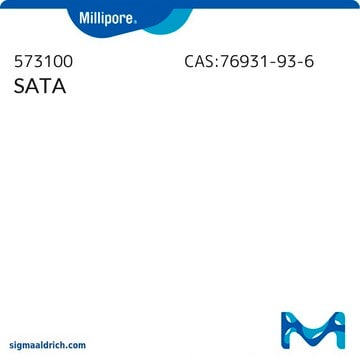推薦產品
一般說明
eMTG (Enhanced Microbial Transglutaminase) is an enzyme that catalyzes the formation of new isopeptide bonds between the primary amine of a drug linker and glutamine residues at position Q295 of IgG-type antibodies to produce site-specifically conjugated antibody-drug conjugates (ADCs).
應用
Site-specific conjugation is increasingly used in drug research, development, and manufacturing to produce ADCs and bioconjugates with defined drug-to-antibody ratios (DAR) since the resulting homogeneity improves safety and efficacy. Transglutaminase (TG)-mediated bioconjugation is a promising means of conjugating drug linkers specifically to the Q295 position of antibodies. However, its use traditionally requires antibody or glycan engineering since the adjacent glycosylation at N297 interferes with the TG reaction. If you’re interested in trying eMTG to make therapeutic ADCs but do not currently have the conjugation setup/expertise, please consider ADC Express™ Service for pre-clinical lead candidate selection.
特點和優勢
• Increased efficiency - with one-step bioconjugation for ADCs
• Glycosylation-tolerant - no need to remove glycosylation allowing for a preserved glycan on the antibody conjugate product
• Built for purpose - eMTG has been designed for producing ADCs and bioconjugates
• For higher-grade quality suitable for cGMP manufacturing of ADCs, please reach out using this form https://www.sigmaaldrich.com/US/en/services/contract-manufacturing/adc-bioconjugation/adc-bioconjugation-request-information with eMTG selected.
• Glycosylation-tolerant - no need to remove glycosylation allowing for a preserved glycan on the antibody conjugate product
• Built for purpose - eMTG has been designed for producing ADCs and bioconjugates
• For higher-grade quality suitable for cGMP manufacturing of ADCs, please reach out using this form https://www.sigmaaldrich.com/US/en/services/contract-manufacturing/adc-bioconjugation/adc-bioconjugation-request-information with eMTG selected.
單位定義
One unit will catalyze the formation of 1.0 micromole of hydroxamate per minute from N Z GLN-GLY and hydroxylamine at pH 6.0 at 37°C.
訊號詞
Danger
危險聲明
危險分類
Resp. Sens. 1
儲存類別代碼
11 - Combustible Solids
水污染物質分類(WGK)
WGK 1
分析證明 (COA)
輸入產品批次/批號來搜索 分析證明 (COA)。在產品’s標籤上找到批次和批號,寫有 ‘Lot’或‘Batch’.。
Stephan Dickgiesser et al.
Bioconjugate chemistry, 31(4), 1070-1076 (2020-03-07)
Site-specific bioconjugation technologies are frequently employed to generate homogeneous antibody-drug conjugates (ADCs) and are generally considered superior to stochastic approaches like lysine coupling. However, most of the technologies developed so far require undesired manipulation of the antibody sequence or its
Stephan Dickgiesser et al.
Methods in molecular biology (Clifton, N.J.), 2012, 135-149 (2019-06-05)
Antibody-drug conjugates (ADCs) are a relatively young class of cancer therapeutics that combine the superior selectivity of monoclonal antibodies (mAbs) with the high potency of cytotoxic agents. In the first generation of ADCs, the toxic payload is attached to the
我們的科學家團隊在所有研究領域都有豐富的經驗,包括生命科學、材料科學、化學合成、色譜、分析等.
聯絡技術服務










